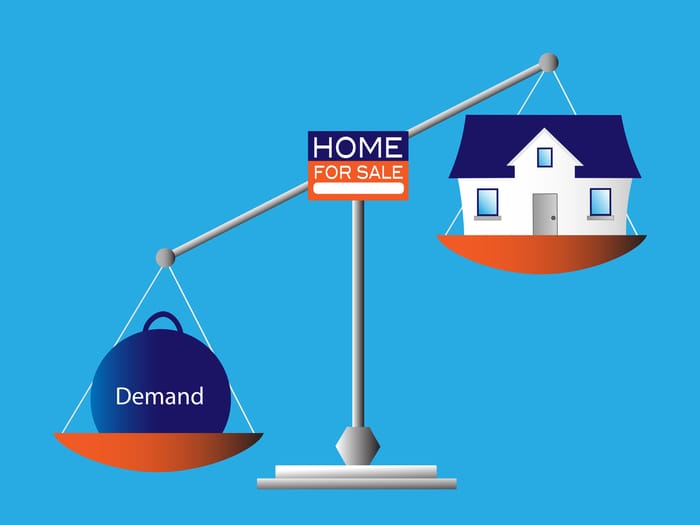Real Estate News Real Estate Trends 2021: What You Need to Know

Top Real Estate Trends of 2021
2020 was a very stressful and challenging year. The pandemic disrupted home sales in the spring of 2020 but the market made a quick rebound towards the end of the year. Will 2021 continue to be as successful as the end of 2020? Here are the 2021 real estate trends you need to know.
Real Estate Trend #1: Low Inventory
Housing inventory is incredibly low across the country. There are just not enough houses for sale to meet the buyer demand. What does this mean for current and future buyers? Low inventory means that you have to act quickly when you go house hunting as houses will be bought quickly. Here is some advice for when you want to buy a home when there is low inventory:
- Sacrifice your wants and needs - You may need to give up some nice-to-haves for your must-haves. Buyers may also want to think about buying a less expensive house and making upgrades over time.
- Expand your search and look at other locations - You may surprise yourself and find a great property in a less popular area.
- Get pre-approved for a loan as quickly as possible before you go house hunting.
What Low Inventory Means for Sellers
Low inventory for sellers means that you have low selling competition and will most likely sell your home quickly. You can also pick the best offer available to you without running the risk of losing offers.
Real Estate Trend #2: Home Prices Continue to Rise
In November of 2020, existing home prices grew by over 15% compared to last year. This is a positive for sellers as it means the market will continue to grow and be in their favor.
What Higher Prices Mean for Buyers
Homes will go fast during a seller’s market and at a higher price. If you plan to build during this type of market, it is important to create a budget and find out how much you can afford. Commit to staying within that budget and do not feel pressure to overspend to get your hands on a house.
To feel confident about buying a home in a seller’s market, follow these tips:
- Limit your house payment to no more than 25% of your monthly take-home pay. This payment includes principal, interest, property taxes, homeowner’s insurance, and, if your down payment is lower than 20%, private mortgage insurance (PMI).
- Save at least a 10–20% down payment. A 20% or more down payment helps you avoid PMI—an extra fee added to your mortgage to protect your lender (not you) in case you don’t make payments. Anything less than 10% will drown you in extra interest and fees.
- Choose a 15-year fixed-rate conventional mortgage. The overall lowest cost home loan is a 15-year fixed-rate mortgage. A 30-year mortgage, FHA, VA, USDA, and adjustable-rate ones will charge you extra in interest and fees.
Use our mortgage calculator to figure out a monthly payment and create a budget you can handle. After creating a budget, work with an expert agent to find houses for sale within your price range.
 What Higher Prices Mean for Sellers
What Higher Prices Mean for Sellers
A nice profit could be coming your way! To get the best offer for your home, work with an experienced real estate agent who really knows your local market and be sure to wait for the right offer. If you are not in a hurry to move, wait for an offer that gives you the most profit.
Real Estate Trend #3: Mortgage Interest Rates are Still Low
The average mortgage interest rate has been very low lately. In fact, the average rate for a 15-year fixed-rate mortgage dropped to 2.31% in November 2020—the lowest it’s been since Freddie Mac started reporting nearly 30 years ago. Economists believe interest rates will continue to hover around 3% in 2021, which is still pretty low.
What Lower Rates Mean for Buyers
Interest rates can help with affordability but be careful not to let that pressure you into buying a house when you are not truly ready. A low-interest rate on a house you cannot afford is still a bad idea. Remember to stick to our advice on monthly payment limit, down payment amount, and mortgage type to keep yourself on track when buying a home.
What Lower Rates Mean for Sellers
If interest rates stay low, buyers will continue to be more motivated to buy your home sooner than later. But, if interest rates do start to increase later in the year, plan for your house to be on the market a little longer. If you do not plan on moving anytime soon, you might still be able to take advantage of these super-low interest rates and shorten your payment schedule by refinancing your mortgage.
Real Estate Trend #4: Online Real Estate Services are Offering Third-Party Buyers
Online services are now offering to buy and sell your house for you due to the seller's market we are currently living in. Companies like Zillow or Opendoor will buy your house from you, put some money into it to resell it at a higher price, handle all home processing procedures like inspections, repairs, and home showings, and then charge you the same as an agent commission for selling costs. These companies may seem appealing because they promise less hassle, but it may mean less profit for you than if you worked with a real estate agent.
“Virtual” Agents
Hybrid services like Redfin aim to reduce traditional agent commissions by handling things all online. This gives you partial services that are similar to working with an agent, but for a fraction of the cost. Think of it as a middle ground between selling with an agent and selling by yourself. But, when selling a home, be wary of the middle ground as this can lead to either selling at a low price or overspending on fees.
Mobile or Online Closings
Digital technology makes it easier to handle document-based tasks virtually. Many home transactions are using electronic signature apps and remote online notarization to streamline the process. There is a chance you can buy or sell a house this year without getting out of your car or ever leaving your current home.
Real Estate Trend #5: Risky Buying Options are Easy to Find
There are some newer “creative” ways to purchase a trending home, but be careful as these can be risky and dangerous.
Rent-to-Own
If you are itching to buy a home but cannot quite afford it yet, some sellers like to offer a rent-to-own agreement. In this deal, you agree to rent the home for a specific amount of time (could be several months to several years) before becoming the owner. The plus side of rent-to-own is that it allows you to bypass the time it takes to save for a down payment and move into a house fast. Also, it means you don’t have to qualify for a mortgage right away.
The downside of rent-to-own is that it makes your rent more expensive because some of your monthly payments will go toward future homeownership. If you later decide you don’t want to buy the house or something breaks your contract, all those extra payments will have been a waste. This option may leave you in a very vulnerable place financially. It is best to wait to buy a home when you can fully afford to instead of risking your finances.
Loans for Down Payments
Another risky buying option that you should avoid is taking out a personal loan to fund a down payment. Purchasing a home with no money down is never a good idea. Buying a house with anything less than a 10-20% down payment will rob you of your other financial goals by having you pay too much extra in interest and fees.
Whether you are selling or buying or doing both at the same time, you can take advantage of the current trends by letting HomeHunt find you a professional real estate agent. Our team will match you with agents we recommend in your area and ensure that you find your dream home.